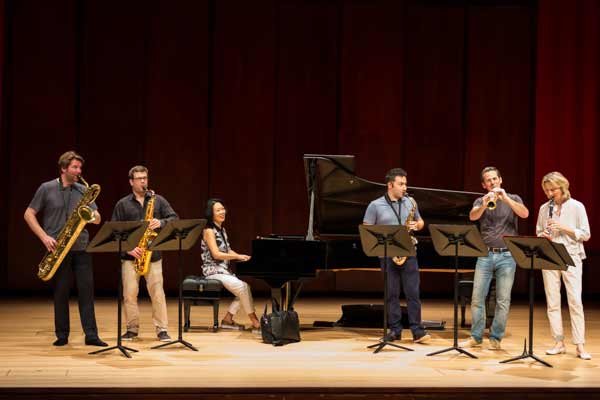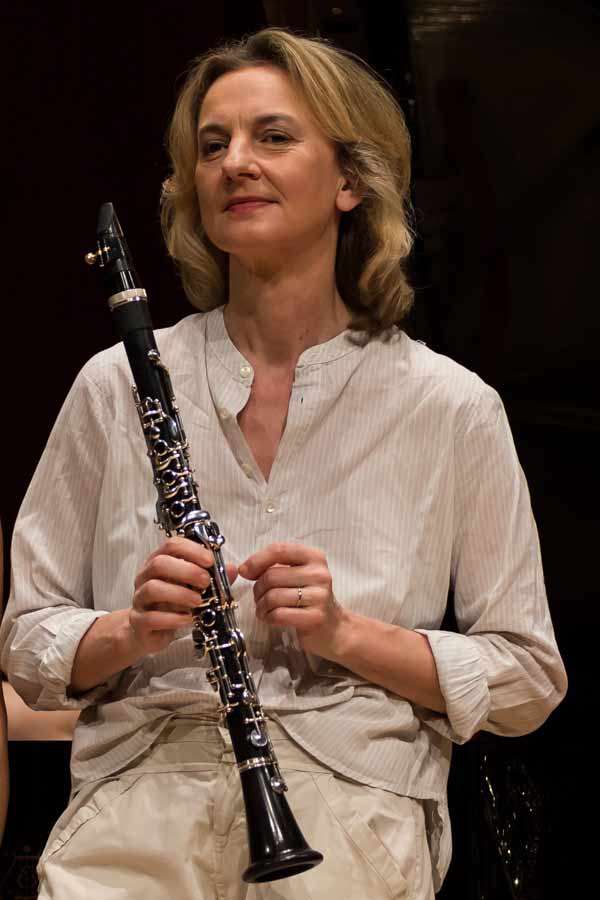‘It’s the music!’
Over the last couple of years, Musica Viva's international concert series has distinguished itself with the inclusion of some unusual programming.
Last year, they kicked things off with the eclectic and wonderful Eighth Blackbird. This year, the combination of renowned clarinetist Sabine Meyer, and the Alliage Quintett ensemble of four saxophones (yes, really!) and piano, continues this welcome trend.

© Karen Hutt
From the start, the rapport and humour among the six players on the stage was clearly evident in their delighted faces and their energetic and joyous application to the music. The fabulous deep notes of Sebastian Pottmeier’s baritone sax provided a sublime and sonorous underpinning to the whole. Although the baritone occasionally obscured the tenor sax, the overall breadth and diversity of sound created by this highly unusual saxophone collective in their entirety was an unexpected delight. Above it all, the clear voice of the clarinet beautifully complemented and enhanced the quintet.
The quintet commenced the evening alone on the stage with the Overture To 'Candide', and were then joined by Sabine Meyer for the remainder of the programme, beginning with 'The Sorcerer’s Apprentice'. All pieces played were arrangements tailored to this unusual collection of instruments; while Musica Viva is not generally in favour of arrangements, in such an exceptional situation, such rules need to be broken. The hybrid nature of the saxophone allows it to transcend its origins as a wind instrument and mimic a surprisingly wide variety of other orchestral sounds. This was ably demonstrated in their interpretation of Dukas’ well known composition, in which the baritone and tenor saxophones walked the baseline underneath the playful tones of the clarinet alongside the alto and soprano saxes.

© Karen Hutt
Split between the first and second parts of the programme, Shostakovich’s Five Pieces were delivered as trios in a variety of combinations; unusually lyrical for Shostakovich, by turns soft and sublime, or jolly and lilting, they had a bright and upbeat feel that sat well with the rest of the programme. The upbeat format continued with Milhaud’s 'Scaramouche', in an arrangement by quintet member Pottmeier, and then after the interval Stravinsky’s 'The Firebird Suite'. After the concluding Shostakovich pieces, they finished up with Borodin’s well-known and lively 'Polovtsian Dances'.
Once or twice the conversion from orchestral score to six piece ensemble resulted in some confusion of sounds, but overall, and in particular during the encore of Bernstein’s 'America', the sound was crisp, clear and extraordinary. This was a brilliantly entertaining evening, in the purest sense of the word. An erudite but accessible programme, an unusual and thought-provoking combination of instruments, and a group of exceptional and engaging musicians, inviting an audience to share the passion and enjoyment of their music-making.

© Karen Hutt
At the end of the post-concert Q&A session, when an audience member asked Sabine Meyer why she was in constant motion whilst playing her clarinet, she replied: ‘It’s the music!’
It certainly is!
Musicians
Sabine Meyer: clarinetDaniel Gauthier: soprano saxophone
Hayrapet Arakelyan: alto saxophone
Simon Hanrath: tenor saxophone
Sebastian Pottmeier: baritone saxophone
Jang Eun Bae: piano
Programme
FantasiaLeonard Bernstein (1918-1990): Overture to Candide (1956) (arr Itai Sobol)
Paul Dukas (1865-1935): The Sorcerer’s Apprentice (1897) (arr Rainer Schottstädt)
Dmitri Shostakovich (1906-1975): From Five Pieces (arr Levon Atovmyan)
I Prelude (from The Gadfly, op 97)
II Gavotte (1933) – no 2 from Ballet Suite no 3 (1952)
Darius Milhaud (1892-1974): Scaramouche (1937) (arr Sebastian Pottmeier)
Igor Stravinsky (1882-1971): The Firebird (1910) – Concert Suite for Orchestra no 2 (1919) (arr Sebastian Gottschick)
Dmitri Shostakovich: From Five Pieces (arr Levon Atovmyan)
III Elegie (Elegy) (1933) – no 4 from Ballet Suite no 3 (1952)
IV Walzer (Waltz) (1936)
V Polka (1935) – no 4 from Ballet Suite no 1 (1949)
Alexander Borodin (1883-1887): Polovtsian Dances (1879) from Prince Igor (arr Stéphane Gassot / Camille Pépin)

